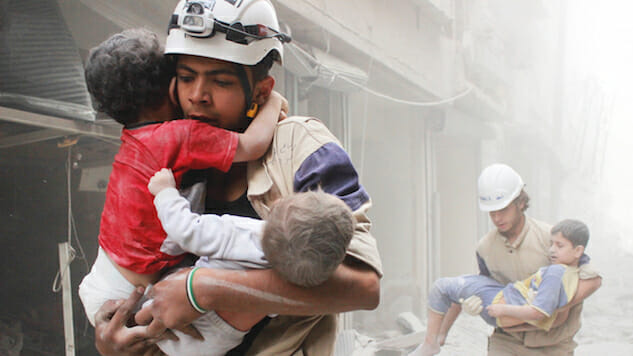HBO’s Cries from Syria Is a Howling Plea for Help Amid a Crisis We’ve Too Long Ignored
Courtesy of HBO
The truth is, I’m slightly at a loss for words here, which isn’t usually a thing with me.
I want to say this: Everyone needs to see HBO’s gut-wrenching documentary Cries from Syria, like post haste, right now, immediately.
I also want to warn you that if you happen to have survived a genocide, you probably shouldn’t do that to yourself. Even if you’ve never been anywhere near one or known anyone affected by one, this film will split you open like a bone saw to the midline, so be prepared.
First off, the kudos, to everyone who worked on what I think is an incredibly affecting and crucially important documentary on the ongoing civil war that has devastated Syria and created a massive humanitarian crisis. Much of the film is pieced together from Syrian citizen-journalists and activists’ footage of real-time attacks and their aftermath, and director Evgeny Afineevsky apparently sifted through hundreds of hours of utterly harrowing raw material. It’s very well-crafted, clearly delineated and thorough, and illuminates for Western viewers a lot of things they probably don’t know about this country or its millions of displaced citizens (of whom an estimated 2.7 million are children). It depicts the chaos and violence that are tearing the country apart in an unflinching, clear-sighted manner. Spliced into this collage of devastation are interviews with activists, ex-military officers (who resigned their posts in protest against the atrocities of the Assad government) and quite a few orphaned children, whose matter-of-fact accounts of their own stories are chilling.
The film gives a very spare gloss on the events that led to the current situation (the facts they do give seem correct, but the intricacies of the Assad regime are not the focus of the documentary). The upshot is that the Arab Spring of 2011 created a wave of optimism that the tyrannical Assad government might also be entreated to, um, step aside. That has not been the result, to put it very, very mildly. Instead, an increasingly layered and confusing array of Syrian Army, peaceful anti-Assad protesters (swiftly followed by armed militias in response to the regime’s crackdown) and, ultimately, ISIS and Russia have razed much of the country to the ground and killed so many Syrian citizens the UN cannot get an accurate count (the rough number appears to be around 400,000).
The focus here is less on the historical details and more on the human beings on the ground: cities reduced to rubble by missiles, phosphorus bombs and chemical weapons (and yes, you will see extremely graphic examples of the results, including real-time footage of people dying in agony from a Sarin attack); the enormous number of refugees (I have read roughly one-fourth of Syria’s pre-war population), who are now perceived as “terrorists” and grave national security threats in countries including this one. There is footage of Bashar al-Assad explaining that his partnership with the Russian government has been essential to the eradication of terrorists—apparently, many of the terrorists in question are schoolchildren and medical personnel, because the Syrian government is bombing the hell out of schools and hospitals.
Cries from Syria is a heartbreaking and horrifying account of a civil war now in its sixth year, and an illuminating look at the millions of people who have been displaced and have nowhere to go. The central questions it poses are very clear, and the film proposes no answers. What is Syria’s future? And why won’t someone just make the carnage stop?
The film is a howling plea for help, and hope. A 10-year-old interviewee faces the camera with the expression of a much older person, and asks, simply, “Where is the humanity?” But through Afineevsky’s lens, at least, there doesn’t appear to be much on the way.
Cries from Syria airs tonight at 10 p.m. on HBO.
Amy Glynn is a poet, essayist and fiction writer who really likes that you can multi-task by reviewing television and glasses of Cabernet simultaneously. She lives in the San Francisco Bay Area.